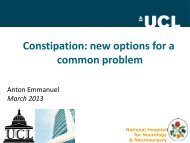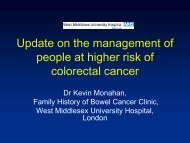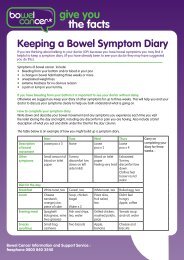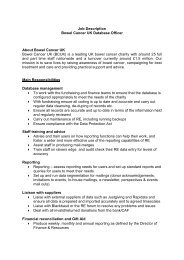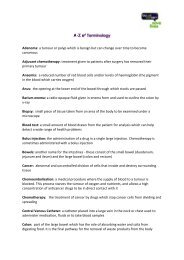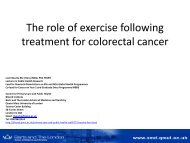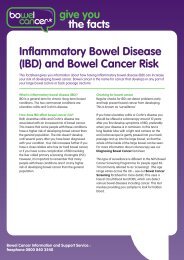Adenomas and Bowel Cancer Risk - Bowel Cancer UK
Adenomas and Bowel Cancer Risk - Bowel Cancer UK
Adenomas and Bowel Cancer Risk - Bowel Cancer UK
Create successful ePaper yourself
Turn your PDF publications into a flip-book with our unique Google optimized e-Paper software.
give youthe facts<strong>Adenomas</strong> <strong>and</strong> <strong>Bowel</strong><strong>Cancer</strong> <strong>Risk</strong>This factsheet gives you information about adenomas <strong>and</strong> how they can increase your risk of developingbowel cancer. <strong>Bowel</strong> cancer is the name for cancer that develops in any part of your colon (large bowel) orrectum (back passage).What are adenomas?An adenoma is a type of polyp, which is a small cluster of cells protruding from the mucosal (contains mucussecreting gl<strong>and</strong>s) lining of the bowel wall. Polyps are quite common <strong>and</strong> tend to occur as people get older.There are two main types:• hyperplastic polyps, which are very unlikely to change into cancer• adenomas, which have the potential to become cancerous.How do adenomas affect bowel cancer risk?Most bowel cancers develop from adenomas, although only a small proportion of adenomas becomecancerous <strong>and</strong> it can take many years for an adenoma to change into a cancer. Because of the risk of thembecoming cancerous, adenomas need to be removed. The risk of adenomas recurring after they have beenremoved depends on their appearance under the microscope, their size <strong>and</strong> number.Although adenomas are associated with an increased risk of bowel cancer it’s important to remember that onlya small percentage will develop into cancer.What are the symptoms?Often polyps don’t cause any symptoms, although some people may get bleeding from their bottom or blood intheir poo. Occasionally polyps produce an excess of mucus or slime that can be seen on or mixed in the poo. Ifyou have any symptoms it’s important to go <strong>and</strong> see your doctor (GP).<strong>Bowel</strong> <strong>Cancer</strong> Information <strong>and</strong> Support Service :freephone 0800 840 3540
give youthe factsHow are adenomas diagnosed?Polyps are usually found using investigations called colonoscopy or flexible sigmoidoscopy. Both theseinvestigations use a flexible tube with a light <strong>and</strong> camera on the end (colonoscope or sigmoidoscope). This isgently passed into your rectum <strong>and</strong> up into the sigmoid colon (flexible sigmoidoscopy) <strong>and</strong> the entire lengthof the large bowel (colonoscopy). For more information about colonoscopy <strong>and</strong> sigmoidoscopy see ourDiagnosing <strong>Bowel</strong> <strong>Cancer</strong> factsheet.You may have a colonoscopy because:• you have had symptoms <strong>and</strong> your doctor has referred you for tests• you have taken part in the NHS bowel cancer screening programme <strong>and</strong> had an abnormal result (for moreinformation see our <strong>Bowel</strong> <strong>Cancer</strong> Screening factsheet)• you have ulcerative colitis or Crohn’s disease (for more information see our Inflammatory <strong>Bowel</strong> Disease(IBD) <strong>and</strong> <strong>Bowel</strong> <strong>Cancer</strong> <strong>Risk</strong> factsheet)• you have a family history of bowel cancer (for more information see our Family History factsheet)• you have had a previous bowel examination showing changes that need follow-up.A sigmoidoscopy is often used if you have bleeding from your bottom <strong>and</strong>/or rectal pain.If polyps are found they may be removed during the investigation or in a separate procedure. Doctors at thehospital can then examine tissue samples from the polyps in the laboratory to find out what type they are.What happens if polyps are found?If the polyps are hyperplastic, then once they have been removed you won’t usually need any further follow-up.Your risk of bowel cancer remains the same as that of the general population <strong>and</strong> you should take part in theNHS screening programme if you are eligible or see your doctor if you develop any symptoms.If the polyps are adenomas your level of risk of bowel cancer will be assessed from the results of thecolonoscopy, known as a baseline colonoscopy. Any follow-up will depend on your level of risk (see tablebelow).BaselinecolonoscopyFollow-upLow risk Intermediate risk High riskOne or two adenomassmaller than 10mmPossible colonoscopyafter five yearsThree or four adenomassmaller than 10mm orone or two adenomas ifone is 10mm or largerColonoscopy after threeyearsFive or more adenomassmaller than 10mm orthree or more adenomasif one is 10mm or largerColonoscopy after oneyearYour on-going level of risk will depend on what is found at follow-up, <strong>and</strong> this in turn will determine whether ornot you are offered further follow-up.This type of follow-up is known as screening or surveillance. The aim is to detect any problems early, beforebowel cancer develops.<strong>Bowel</strong> <strong>Cancer</strong> Information <strong>and</strong> Support Service :freephone 0800 840 3540
give youthe factsShould I take part in the NHS <strong>Bowel</strong> <strong>Cancer</strong> Screening Programme after I’ve had adenomas removed?The NHS runs a <strong>Bowel</strong> <strong>Cancer</strong> Screening Programme for people within an eligible age group. This uses a FaecalOccult Blood test (FOBt) to look for hidden blood in poo, which may be a sign of cancer. If you are eligible, youare recommended to take part in the screening programme.You can find more detailed information about the programme in our <strong>Bowel</strong> <strong>Cancer</strong> Screening factsheet.Can I do anything to reduce my risk of bowel cancer?Doctors <strong>and</strong> researchers don’t yet know the exact cause of bowel cancer. However, we do know that certainfactors, including adenomas, may contribute to a higher risk. While some risk factors are out of your control,you may still be able to reduce your risk of bowel cancer through lifestyle changes, such as eating a healthydiet <strong>and</strong> taking regular exercise. You can find out more from our Good <strong>Bowel</strong> Health booklet <strong>and</strong> <strong>Bowel</strong><strong>Cancer</strong> Symptoms <strong>and</strong> <strong>Risk</strong> Factors factsheet.Further sources of informationWe have a range of related factsheets <strong>and</strong> booklets that you can download from our website here:www.bowelcanceruk.org.uk/resourcesTo find out more about this product, or to tell us what you think, please call us on 020 7381 9711 or emailfeedback@bowelcanceruk.org.uk© <strong>Bowel</strong> <strong>Cancer</strong> <strong>UK</strong><strong>Adenomas</strong> <strong>and</strong> <strong>Bowel</strong> <strong>Cancer</strong> <strong>Risk</strong> factsheetInformation correct at time of publication: July 2012Date for review: July 2014For further information contact the <strong>Bowel</strong><strong>Cancer</strong> Information <strong>and</strong> Support Service:Freephone 0800 8 40 35 40Email: support@bowelcanceruk.org.ukWebsite: www.bowelcanceruk.org.ukLondon office7 Rickett StreetLondon SW6 1RUTel: 020 7381 9711Fax: 020 7381 5752Edinburgh office20 Queen StreetEdinburgh EH2 1JXTel: 0131 225 5333Fax: 0131 225 2206Registered Charity Number (Engl<strong>and</strong> & Wales) 1071038. Scottish Charity Number SCO40914. A Company Limited by Guarantee Number 3409832 (Engl<strong>and</strong>). Registered Office (London) as above.



